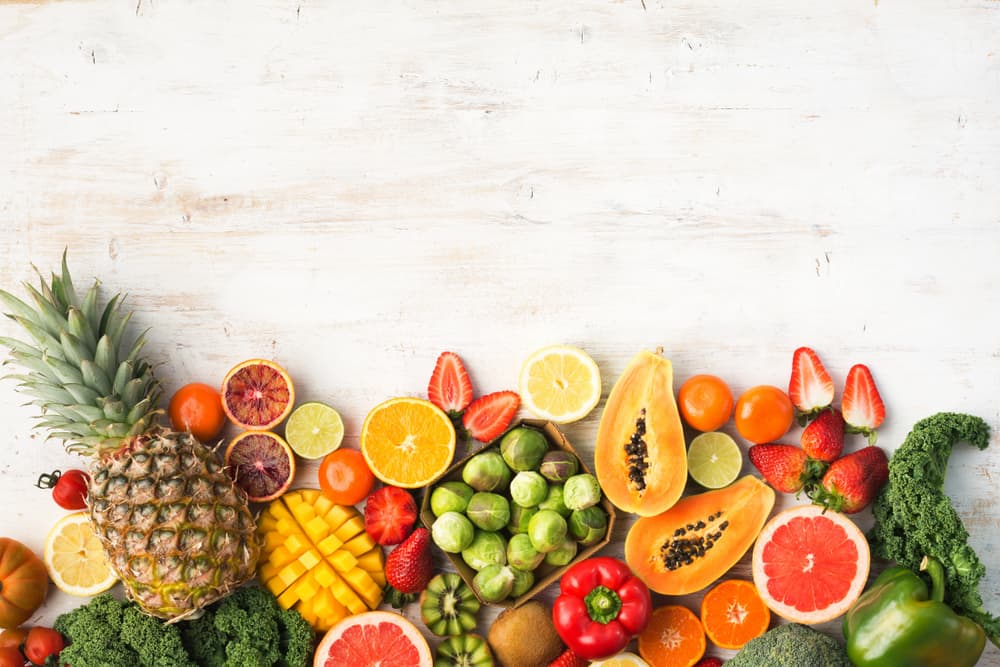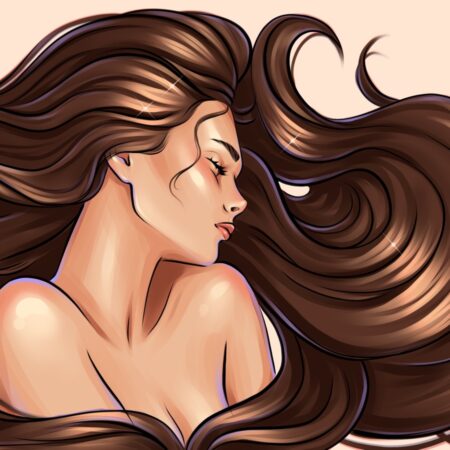Hair product commercials always show you thick, shiny hair. It looks good, and it must feel good, too, right? Maybe you look at your own hair and get disappointed that it isn’t as thick as what you see on TV. Fortunately, there are ways you can naturally make your hair thicker so you don’t have to spend a bunch of money on treatments or extensions.
Help! Why Is My Hair So Thin?
If you want thicker hair, you’re probably wondering why it’s thin. If it’s always been thin, it probably comes from your parents. If it seems like it’s thinner than usual, it could be a because of using certain shampoo or something going on in your body.
It Might Be in Your Genes
There’s a lot of different hair types out there: blonde, brunette, coarse, fine, and yes – thick and thin. Some people are born with thick hair, while others have thin hair. If you’ve never had super thick hair, it’s probably in your genes.
Unfortunately, not a whole lot can be done to reverse this because there isn’t anything to reverse. You can, however, try the suggestions in this article to encourage your hair to grow thicker.
It Might Be Your Eating Habits
Eating a healthy diet full of vitamins is a great way to contribute to hair health. Your body needs nutrients to be healthy, and so does your hair. This article will cover how nutrition plays such an important role in maintaining healthy hair. We’ll also look at some natural DIY treatments to help your hair gain or re-gain thickness.
If your thin hair is a result of genetics, don’t sweat it too much. The grass is always greener, and believe it or not, some people born with thick hair wish they had thin hair. After all, it gets hot in the summer under all that hair.
You Might Be Overdoing It
If thin hair is unusual for you, it could be a result of caring about it too much. That’s right – too much heat, chemicals, and ponytails can damage your hair over time.
If you frequently use dye, bleach, curling irons, or flat irons on your hair, you could be harming it. The chemicals and heat can wear down your hair and cause it to break, which will lead to thinning over time. You probably won’t notice it at first, but when you do, it’s time to go easy with the hair products.
Tight updos can also lead to thinning by breaking hair. Whether it’s tight braids or a high ponytail, the constant strain on the individual strands will make them break, and your hair will start to look thinner.
If you think any of these problems might be the cause of your thin hair, try the following:
- Wear your hair down or in loose hairstyles more often
- Take a few months off from dyeing your hair
- Don’t use heated tools on your hair as often
It Might Be Medical
Thin hair can be the result of a hormonal imbalance or a side effect of a medication. Pregnancy causes your hormonal balance to change, and it might make your hair thin out. Thyroid disorders are another common reason hair becomes thin, and generally, these disorders are more common in women.
If you think medication or a condition is causing your hair to fall out, then it’s best to see a doctor. A healthy diet and hair treatment might help your hair grow back thicker, but the underlying issues will remain until they’re properly treated.
Vitamins and Hair Vitality

Your body requires vitamins to be healthy. Your hair is part of your body, so it also relies on proper nutrition to make it shiny and thick. If you’re not getting enough vitamins in your diet, you shouldn’t expect your hair to be at its best. Make sure you’re getting all of the vitamins by eating a well-rounded diet. Not only will your hair shine, but your whole body will be at its best, too.
Vitamins help your body in many ways, and there are many hair benefits, too. To help your hair, you should have a good understanding of what the vitamins do and how they do it.
Vitamin A
Vitamin A is responsible for cell growth in your entire body, including your hair cells. It also aids in sebum production, which is the oil your hair makes that’s responsible for keeping your scalp moist. You might be disgusted by oily hair, but some oil is necessary to keep your hair shiny and healthy.
Vitamin A is often found in carrots, eggs, kale, milk, spinach, and sweet potatoes. If you eat enough foods with vitamin A, you won’t need to take supplements. Indeed, overdosing on vitamin A can cause hair loss – not the desired outcome at all. Too much vitamin A actually speeds up the rate your hair grows and will cause the hair to fall out faster than your body can replace it.
However, a lack of Vitamin A slows down hair growth and might even stop production altogether. Your body will want to “save power” when it sees that it isn’t getting enough vitamin A, and the hair factory is the first place that shuts down. So find a careful balance.
Vitamin B
Vitamin B helps hair growth in those who are Vitamin B deficient. It’s actually hard to be deficient because many foods have it in them. Staples like eggs, fish, grains, red meat and avocado all contain great amounts of Vitamin B.
Even a poorly balanced diet of fast food or take-out will provide vitamin B because it’s found in beef patties and rice. This doesn’t give you the OK to ditch vegetables altogether, though.
The Vitamin biotin is commonly used for hair growth treatment, but it isn’t that helpful in people who aren’t vitamin B deficient. This vitamin makes red blood cells that bring oxygen to the scalp. It also provides nutrients to the scalp, so it’s an essential vitamin if you want thick hair.
Vitamin C
Free radicals are out-of-control atoms in your body – their name makes sense. These atoms are responsible for the physical symptoms of aging: wrinkles, grey hair, and hair loss.
Vitamin C is the defender against these bad guys. It helps you absorb iron, which is necessary for your hair to grow, and it helps make a protein called collagen, which is the protein that gives structure to your hair and your skin. Without Vitamin C, your scalp wouldn’t be able to hold the hair in place, if you even had any growing.
Where do you find this much-needed antioxidant? If it grows in the ground, it has vitamin C. Some of the most vitamin C-dense foods include citrus fruits like oranges and lemons, as well as staples like broccoli and tomatoes.
A deficiency will lead to dry hair that’s prone to splitting, among other health issues. Dry skin, swollen joints, slowed metabolism, and nosebleeds are all possible signs that you’re deficient in it.
What about overdosing on vitamin C? It’s not really a concern because it’s not common. Your body can’t store vitamin C, so you likely won’t overdose unless you take a ridiculous amount of supplements (which isn’t recommended, of course).
Vitamin D
A deficiency in Vitamin D will lead to – you guessed it – hair loss. Notice a pattern? Take your vitamins or lose all of your hair.
Sunshine is the best way to get vitamin D. Salmon, sardines, tuna and egg yolk also contribute.
Don’t like these foods? You’re better off going outside. Or, try fortified foods, which means Vitamin D is added to the food. Orange juice, milk, and cereal usually have vitamin D added to them.
Vitamin E
Vitamin E is like Vitamin C: it fights off those free radicals. A study showed that people had significant hair growth after taking vitamin E supplements for several months.
This vitamin is a strange one. Healthy people don’t usually show signs of a deficiency, and a deficiency is usually caused by diseases that prevent you from properly absorbing the vitamin. Muscle and nerve damage is a sign that you lack this vitamin.
Overdosing vitamin E supplements can be highly dangerous since it can increase bleeding in the brain. Therefore, it’s best to get your Vitamin E from foods like Broccoli, Spinach, Nuts and fortified foods.
Food: Not Just for Eating!
Consuming these vitamins through fruits and vegetables is effective and essential, but that’s not the only way.
You can also directly treat your hair. Yup, putting food on your hair can be a great way to encourage hair growth naturally. You probably have these items in your fridge already, and if you don’t, you can pick them up when you go grocery shopping.
Many of these remedies are more for reducing hair loss rather than make your hair thicker.
Avocado
Avocado will moisten your hair and provide vitamins B and E. Olive oil is a great source of vitamin E, as well. Dry hair can lead to breakages, which eventually turns into thinning hair. If your hair has a dry spell, make this special guacamole for your head.
Mix the following in a bowl:
- 1 avocado
- 1 tablespoon olive oil
Apply it to your hair and scalp and keep it there for half an hour. Wash it out with some gentle shampoo. Use this 1-2 times a week to keep your hair moist.
Eggs
While the thought of putting raw eggs in your hair may be disgusting, doing so 1-2 times a week can be a great way to strengthen and thicken your hair. Eggs have plenty of protein, which helps hair grow strong. They’re also full of vitamins A, B, and D.
For whole eggs:
- Beat 2 eggs together
- Apply on damp hair
- Leave for half an hour, and then wash it out
For egg yolks:
- Beat 1-2 egg yolks with 1 tablespoon of olive oil and 2 tablespoons of water
- Apply on dry hair
- Leave for 15 minutes, then wash it out
Olive Oil
Olive oil has vitamin E and can bring much-needed moisture to a dry scalp. It also encourages the hair to grow thicker and will make it feel softer. You can use this method as often as you need.
- Warm olive oil to your body temperature
- Apply to scalp and hair while warm
- Leave for up to 45 minutes or overnight, then wash it out
If you leave it on overnight, it’s recommended that you use a shower cap or some other cover so the oil will stay on your hair and won’t ruin your pillow.
Oranges
As discussed above, the vitamin C in oranges fight off free radicals and keeps your hair healthy. Blend up an orange – yes, you have to use the pulp – and apply it on your scalp and hair. Let sit for up to an hour and then rinse it out. You can use conditioner afterward since it might leave your hair feeling a little dry. On the bright side, the oranges will leave your hair smelling like the fresh fragrance of summer.
Natural Treatments for Your Hair
If your hair is damaged from chemicals and heat, natural remedies are a great way to boost your hair temporarily. They’ll help soothe your hair and won’t cause any extra damage to them. Plus, your hair will absorb the nutrients from the foods.
With nutrients coming from a healthy diet and natural hair treatments, your hair is sure to thicken up the way you want.

Castor Oil And Aloe Oil
Castor oil – a vegetable oil derived from castor beans – is a great natural remedy for hair loss. Massage castor oil into your hair for 3-5 minutes and then cover it for an hour or two. Then, gently shampoo and condition your hair to get rid of the grease and enjoy a sheen of lovely hair. The same can be done with Aloe oil. It’s slightly more expensive, but has a similar effect.
Scalp Massages and Quality Shampoos.
Koreans believe that poor hair comes from a poor scalp. In Korea, head massages are regularly recommended as crucial for a perfect head of hair. So, why not indulge yourself and get one, or get someone you love to give you one!
Korean shampoos also target scalp and hair loss with special formulations using ginseng and paraben and sulfate-free formulas.
Another pearl of eastern wisdom is the benefits of green tea. Green tea is known to have a huge range of health benefits, but recently it’s been proposed that it also has an anti-androgen effect. If so, it would help protect against baldness. The jury is still out, however.
Eat Well, Get Thick (Hair!)
Ultimately, a good diet is key. If your genes aren’t out to get you, then a good diet will contribute so much to your hair being the best it can be and to help it recapture its former luster. So eat well, alongside using gentler shampoos and some natural remedies on your hair, and soon enough, you’ll find that your hair can come out from under the hat.
